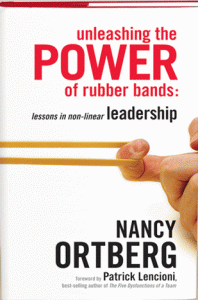As the one year challenge to read a book a week hits the middle third, I’m finding myself increasingly thrilled when I read one that really excites me, and this one did. Unleashing the Power of Rubber Bands, by Nancy Ortberg, didn’t excite me because I finished it with a list of 5 things that every leader needs to do. It excited me because I found moving stories and motivational lessons from an experienced leader who has a fantastic writing style.
If you’re a ministry or non-profit leader, you’ll find great encouragement in this book. If you’re a project manager who feels in over your head, you’ll find some practical tips embedded in the author’s stories that will help you catch your breath. Even if you aren’t currently in a position of leadership, you’ll find Ortberg’s authenticity and humor refreshing. There are plenty of scholarly and theory-driven books out there on leadership, but this one takes a fresh, conversational approach that absolutely delivers.
Throughout the book, the author shares examples of her successes and failures (you’ll find yourself appreciating those more than the first group!) from many different types of leadership positions, whether in ministry or business, and also is liberal in revealing the impact that numerous mentors have had in her life. At many times in the book I made notes about which of these mentors would be the author of the next book I read based solely on the little that Ortberg revealed about her relationships with them.
Always one to take the road less traveled in her thinking, Ortberg seems to find the role of “outside the box devil’s advocate” a natural one. She does a fantastic job pointing out the often overlooked “third option” in the sticky situations leaders find themselves in, and many of these will be what turns on the lightbulb in your mind about problems you may be facing right now in your leadership.
Of particular benefit to me was the chapter entitled “When to Worry,” which challenged the popular notion that everything is going well when there are no problems. Always one to highlight the tension in leadership, Ortberg uses example after example to show how leaders need to worry when there isn’t conflict within the team or organization because conflict is what pushes us toward growth. Not what you’d expect to read, but what a great observation.
Some other noteworthy highlights:
Good leaders make sure no one is overlooked.
Much of a vision’s power lies in what it taps into. Done well, vision connects to that part of us that desperately wants to be involved in something deeper, something with meaning and significance. Vision releases ongoing energy in individuals and organizations that perpetuates and fuels itself. Vision lifts heads, stirs souls, and taps hearts. It creates and fosters and strengthens and stimulates. It engages passion, which is a profound source of motivation. Vision brings out the best, where before, good enough was good enough.
Vision is a team sport. It is not a solo endeavor. Far too often, leaders present their vision to a group and then get confused when the progress seems slow or people are reluctant. Very few people are motivated when they are handed a vision. Most want to be part of determining and shaping that vision. And when you invite people to the table with you to do that, you deeply honor their dignity and the image of God embedded within them.
[The] intersection of vision and reality may be one of the greatest tests of leadership. It is having sober eyes and an optimistic spirit, and refusing to choose between the two.
This intersection of vision and reality may be one of the greatest tests of leadership. It is having sober eyes and an optimistic spirit, and refusing to choose between the two.
Probably about eleven times out of ten, the answer to your most burning leadership issue is to have the conversation.
Is the life you’re inviting others into, the life you’re leading?
Again, this book is challenging, but it is a must-read for anyone in leadership, and probably a must-read for anyone. I highly recommend it and don’t think you’ll be sorry I did when you’re finished with it.







